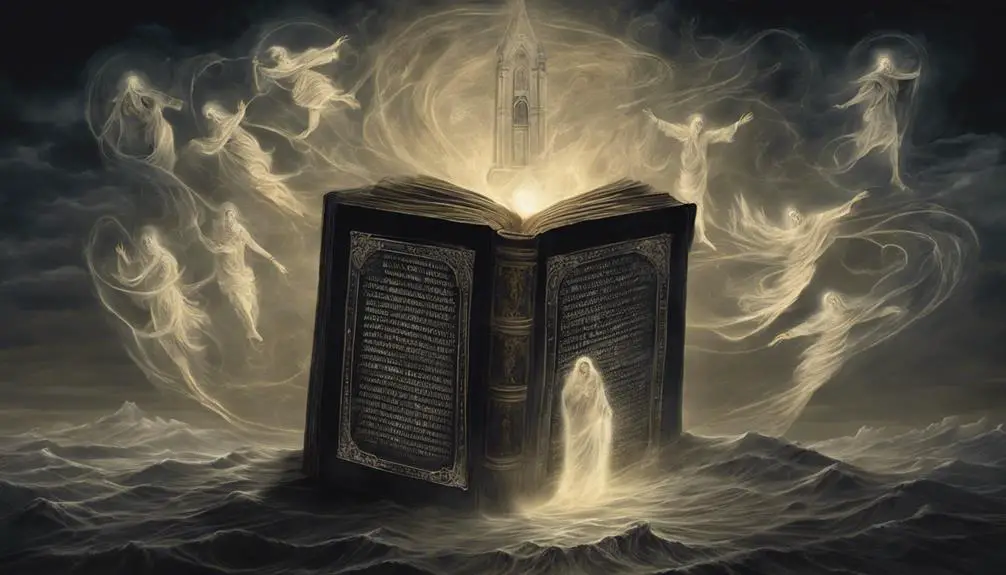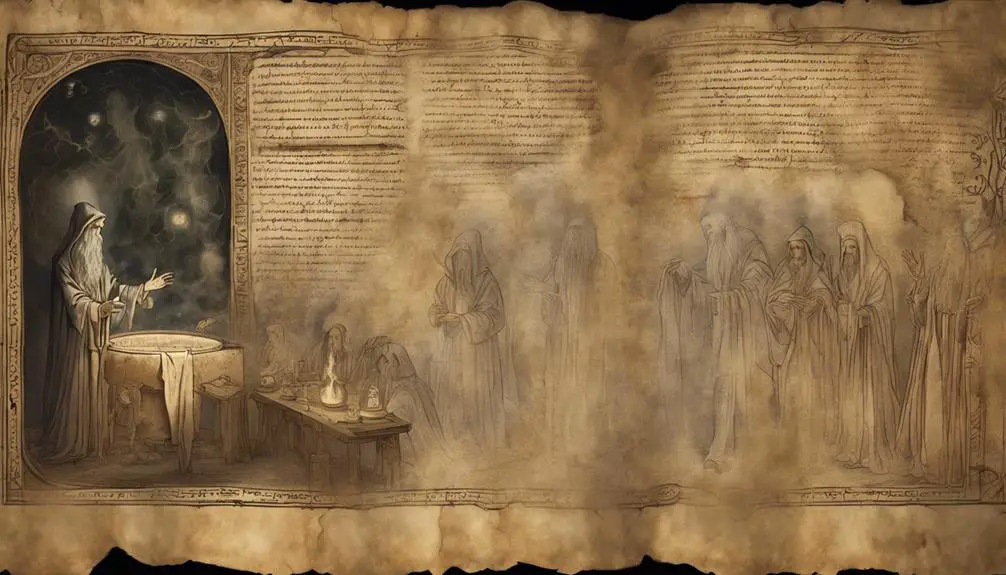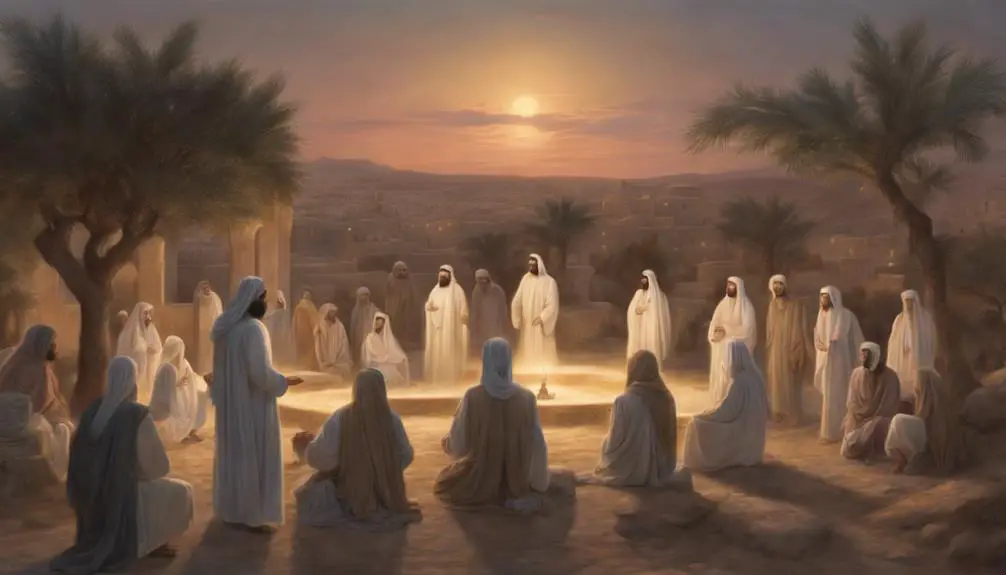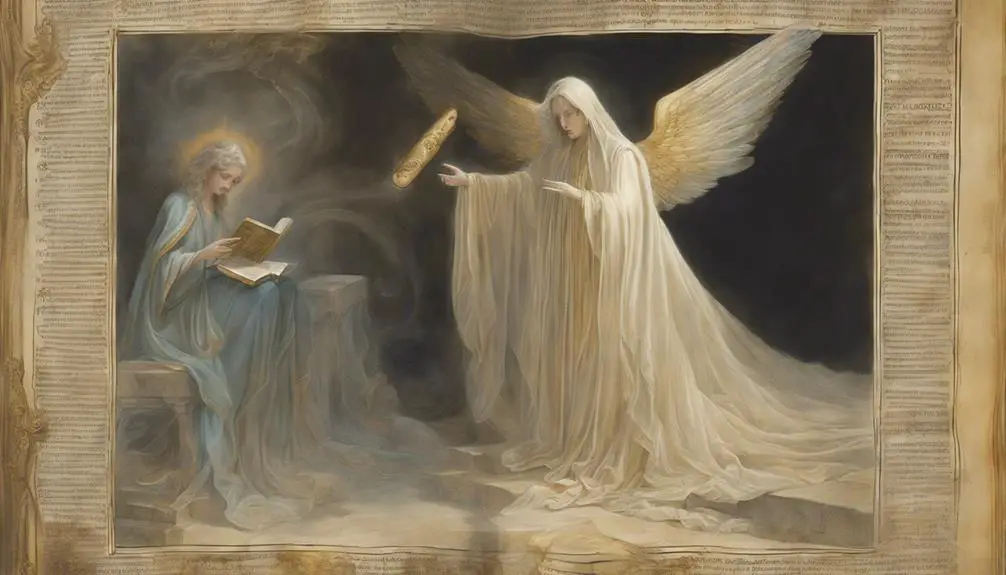Ghosts in the Bible – an intriguing exploration into the enigmatic world of the supernatural in sacred scriptures awaits your curiosity.

Are There Ghosts in the Bible
Like a detective piecing together a complex case, you're on a quest to explore one of the most enigmatic topics in biblical interpretation: the existence of ghosts in the Bible. The scriptures can sometimes seem as nebulous and elusive as the entities you're investigating.
While you're likely familiar with clear depictions of angels and demons, can the ethereal figures often considered as 'ghosts' be found in sacred texts too? Unraveling this mystery could bring you a fresh perspective on the world of the spiritual and the supernatural.
Key Takeaways
- The Bible contains narratives often interpreted as encounters with spirits, not necessarily ghosts as understood today.
- Old and New Testaments feature spectral appearances, seen as prophetic visions or divine messages rather than hauntings.
- Jesus' teachings mention spirits, but understanding of these references requires insight into cultural and linguistic context.
- Parallels exist between ghosts and angels in the Bible, serving as messengers between the physical and divine realms.
Biblical Interpretation of Ghosts

In examining the biblical interpretation of ghosts, you'll find a tapestry of cultural beliefs, historical context, and theological interpretations that shape our understanding of these spectral figures. The Bible doesn't directly address the concept of ghosts as we understand them today: haunting spirits of the deceased interacting with the living. However, it does include narratives that have been interpreted as ghost prophecies or spiritual encounters.
When you delve into these ghost prophecies, you'll uncover the biblical accounts of perceived interactions between the living and the spiritual realm. These accounts are often linked with prophetic visions or divine messages, rather than hauntings. The distinction is crucial in understanding the biblical perspective on haunting spirits. In the biblical context, these aren't restless or vengeful spirits, but divine manifestations meant to deliver a message or fulfil a purpose.
You'll find that the Bible's approach to spirits is complex and multifaceted, influenced by cultural, historical, and theological factors. It's not a straightforward endorsement or denial of ghosts as we conceive them but rather a nuanced exploration of the interaction between the physical and spiritual realms.
Old Testament Ghost References

Exploring the Old Testament, you'll find several references that have been interpreted as encounters with ghosts or spirits. These instances, often shrouded in ambiguity, have intrigued scholars and led to a comprehensive spiritual beings analysis.
One prime example is in 1 Samuel 28, where the Witch of Endor summons the spirit of the prophet Samuel. Here, this apparition isn't referred to as a ghost but as 'Elohim', a Hebrew term often rendered as 'gods' or 'spirits'. The narrative remains neutral, not explicitly endorsing or denying the existence of ghosts, yet it provides a fascinating glimpse into ancient Israelite beliefs about the afterlife.
There are also instances in the books of the Prophets where visions contain what could be interpreted as ghostly figures. These ethereal entities, often referred to as 'malakh', or angel, appear in various forms and play significant roles in the divine revelations received by the Prophets.
While the Old Testament doesn't explicitly mention 'ghosts' in the modern sense, it does provide ample references to spiritual beings. It's important, however, to approach these texts with caution, understanding that our contemporary conception of ghosts may not align with ancient Israelite understandings.
New Testament Spectral Appearances

Shifting focus to the New Testament, you'll encounter numerous instances where spectral appearances, often perceived as ghosts, play pivotal roles in the unfolding narrative. Here, the term 'Spectral Visions' aptly describes these spiritual phenomena.
Take Paul's Encounters, for instance. On the road to Damascus, Paul is said to have been visited by a spectral vision of Jesus Christ. Although not explicitly termed a 'ghost', the occurrence bears striking similarities to modern-day ghost sightings. The vision was sudden, overwhelming, and carried a profound message. Paul's experience is a testament to the spectral appearances recorded in the New Testament, displaying their transformative potential.
Similarly, in Acts 12, Peter is visited by an angel who liberates him from prison. The spectral figure's sudden appearance and miraculous abilities often lead to its interpretation as a ghost-like entity.
In both Paul's and Peter's encounters, the spectral visions aren't feared but revered, embodying divine messages and interventions. These occurrences highlight a shift from the Old Testament's depiction of specters as eerie, elusive figures, to the New Testament's portrayal of spectral entities as divine messengers. Thus, the New Testament presents a nuanced perspective on spectral appearances, suggesting their potential for divine communication and intervention.
Ghosts in Jesus' Teachings

Now, let's turn our attention to the teachings of Jesus, where references to spirits and apparitions offer even more insight into the Bible's perspective on ghosts. His parables and supernatural discussions often contain mentions of spirits. However, it's crucial to distinguish between a 'spirit' and a 'ghost' as we understand it today.
In Jesus' parables, mentions of spirits are frequent. For instance, in the parable of the unclean spirit, Jesus speaks of a spirit that, once expelled, returns with seven others more wicked than itself. This seems to echo the concept of a restless or malevolent spirit, characteristics often associated with modern interpretations of ghosts.
However, in these supernatural discussions, it's vital to remember the cultural and linguistic context. The term used for 'spirit' in the original Greek text is 'pneuma,' which can be translated as breath, wind, or spirit. This doesn't directly correspond to our current understanding of a ghost as an apparition or the soul of a dead person.
Parallels Between Ghosts and Angels

Drawing parallels between ghosts and angels in biblical context, you'll find a fascinating intersection of spiritual entities that may challenge traditional notions of the supernatural. One aspect of this intersection is the perception of angelic apparitions. Angels, like ghosts, are often shown appearing to humans in ethereal form, communicating messages from the divine sphere.
In the spirit world, it's noted that angels are God's messengers, often appearing in dreams or visions to deliver divine messages. Ghosts, in comparison, are spirits of the deceased, expressing unresolved issues or offering guidance. They, too, communicate with the living, albeit for different reasons.
There's a significant overlap here. Both entities communicate from the spirit world to ours, acting as a bridge between the physical and the divine. Both have the ability to appear and disappear at will, and both can interact with humans, albeit in different capacities.
The key difference lies in their origins and purposes. Angels are heavenly beings created by God, conveying divine will. Ghosts, on the other hand, are human spirits lingering after death, often attached to earthly matters. Despite these differences, the parallels between the two are undeniable and worth exploring further.
Frequently Asked Questions
What Are Some Modern Interpretations of Ghosts in Relation to the Bible?"
Modern interpretations of 'spiritual apparitions' in relation to the Bible often equate these to 'biblical entities' like angels or demons.
You'll find scholars suggesting that these apparitions are manifestations of spiritual beings, rather than the souls of the deceased.
They'll argue that the Bible doesn't necessarily support the concept of ghosts as we understand it today, but rather presents different forms of spiritual existence.
How Does the Concept of Ghosts in the Bible Compare to Other Religious Texts?"
You're comparing ghost concepts across different religious texts. In the Bible, spiritual entities often refer to angels or demons, not typically to ghosts as we think of them.
This contrasts with other religions' afterlife beliefs, where spirits of the deceased play a more prominent role.
It's crucial to examine each text's cultural and historical context to fully grasp its unique interpretation of what we might label as 'ghosts'.
What Are the Psychological Explanations for Belief in Ghosts?"
You're curious about the psychological explanations for belief in ghosts, aren't you?
Ghost sightings psychology often ties to the brain's pattern-recognition and fear responses.
Paranormal belief analysis suggests that these beliefs can stem from a need for comfort in the face of uncertainty or loss.
It's also worth noting how powerful suggestion and groupthink can be in fostering these beliefs.
Are There Any Significant Cultural Differences in Perceiving Ghosts in Biblical Context?"
You're asking about cultural differences in perceiving ghostly apparitions within a biblical context. While the Bible doesn't explicitly mention ghosts, it's filled with symbolic apparitions.
These 'ghostly' figures are often interpreted differently across cultures, shaping varying perceptions of the spiritual world. For instance, Western societies might view them as lost souls, while Eastern cultures could see them as ancestral spirits.
It's important to consider these cultural lenses when studying biblical symbols.
How Have Historical Events Influenced the Concept of Ghosts in Biblical Interpretation?"
You're studying how historical events have shaped the concept of ghosts, or more accurately, spiritual apparitions, in biblical interpretation.
It's crucial to remember that biblical supernatural elements were often influenced by societal changes and cultural shifts.
As societies evolved, so did their understanding of the spiritual world.
This evolution has led to various interpretations of the existence of spiritual apparitions within the Bible.
Conclusion
In analyzing Biblical texts, you'll find no clear-cut references to ghosts as we understand them today. However, instances of spiritual apparitions or spectral figures can be found, especially in the Old and New Testaments.
Jesus' teachings also indirectly touch on ethereal entities. Finally, parallels can be drawn between angels and ghosts, though they're distinct entities.
Therefore, while the Bible doesn't explicitly mention ghosts, it does present a complex view of the spiritual realm.



Sign up